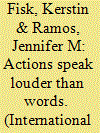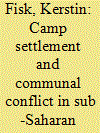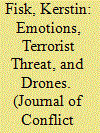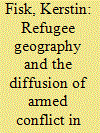| Srl | Item |
| 1 |
ID:
132358


|
|
|
|
|
| Publication |
2014.
|
| Summary/Abstract |
How and to what extent is the preventive use of force becoming the future of foreign policy for states around the world? We explore the spread of preventive logic to increasing numbers of states and examine the degree to which an international norm toward preventive self-defense is cascading in the international system. Through content and comparative case study analysis, we investigate leaders' rhetoric and security policies concerning what we theorize is the key indicator of a country's emulation of the United States: assertion of the right to the unilateral, preventive use of force outside of its borders. Our evidence indicates that there has been a shift away from the established international norm-which considers the use of preventive force illegal and illegitimate-toward growing acceptance of unilateral preventive strategies, a shift largely propelled by the precedents set by the United States in the war in Iraq and its use of unmanned aerial vehicles (UAVs or drones) in the global war on terror. Our findings also reveal that some states are applying the strategy of preventive self-defense beyond the use of UAVs for targeted killings to the extreme contingency plan for nuclear war. We conclude by discussing possibilities for further research and considering the implications of this phenomenon.
|
|
|
|
|
|
|
|
|
|
|
|
|
|
|
|
| 2 |
ID:
164555


|
|
|
|
|
| Summary/Abstract |
Are areas that host encamped refugees more likely to experience communal conflict, and under what conditions? Building on insights from the refugee studies literature suggesting that settling refugees in camps can intensify intercommunal tension in host communities, this article investigates the effect of refugee encampment on the occurrence of communal conflict at the subnational level in sub-Saharan Africa. It first tests for a general relationship between the overall presence and population intensity of encamped refugees and communal conflict before assessing whether this relationship is moderated by local-level characteristics, including interethnic linkages and political and economic marginalization within the host region. The basic findings show that communal conflict occurs more frequently in regions where refugees are camp-settled. Tests for interactive effects indicate that refugee camps have a significant marginal effect on conflict only if they are located in areas with politically marginalized host groups. Origin country/host region ethnic ties are shown to exert significant moderating effects. Moreover, results from an extended set of analyses show that the form of refugee settlement matters, as the presence and population intensity of self-settled refugees are related to decreases in the occurrence of communal conflict.
|
|
|
|
|
|
|
|
|
|
|
|
|
|
|
|
| 3 |
ID:
165262


|
|
|
|
|
| Summary/Abstract |
In this article, we investigate how threat perceptions and emotions can jointly impact individuals’ attitudes toward drone strikes. We argue that conditions of threat can increase public support for the use of drone strikes. We further contend that the effect of threat perceptions on support for drone strikes is mediated by negative, emotional reactions, particularly anger. We test our arguments in France, the United States, and Turkey using data generated from nationally representative online surveys, in which individuals were randomly assigned to a control group, a condition in which they read about terrorist threat (with or without a reminder of democratic values), or a condition in which they read about economic threats. Our findings have implications for long-standing notions about the roles of rational calculations and psychological processes in influencing support for aggressive foreign policy.
|
|
|
|
|
|
|
|
|
|
|
|
|
|
|
|
| 4 |
ID:
157907


|
|
|
|
|
| Summary/Abstract |
Previous research demonstrates that refugee populations can threaten the security of receiving countries. This study, in contrast, seeks to examine the physical security challenges refugees face in host states. It utilizes a new, geographically referenced data set on subcountry refugee demographics to test the hypothesis that locations home to larger refugee populations are more likely to experience one-sided attacks by conflict actors. Results demonstrate that refugee accommodation is a significant predictor of one-sided violence in Africa. In particular, combatants commit significantly more acts of violence against civilians in locations home to larger numbers of self-settled refugees compared to other locations. These findings suggest that scholars and practitioners account for possible dangers presented by refugee flows and threats to refugees simultaneously.
|
|
|
|
|
|
|
|
|
|
|
|
|
|
|
|
| 5 |
ID:
136090


|
|
|
|
|
| Summary/Abstract |
Why are refugee populations associated with the spread of conflict? Do refugees upset local dynamics by increasing the mobilization opportunities of rebels? Work on rebel motivation predicts that the strategic impact of a location influences armed actors' decisions to fight there; thus, I identify two strategic aspects of refugee geography which may influence where conflict takes place in the host country – refugee mass and refugee accommodation type. I examine the influence of these factors using a new, disaggregated dataset on refugees in 26 African countries engaged in armed conflict during the period 2000–2010.
|
|
|
|
|
|
|
|
|
|
|
|
|
|
|
|